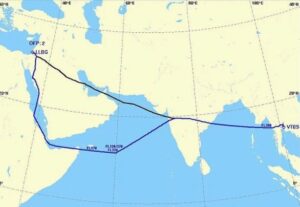Oman is opening up its borders and minds for some welcome change, given the developments since yesterday. Thursday proved to be a red-letter day for the EMEA region on two fronts with Oman announcing some changes to the hitherto conventions.
The Vatican and Oman have established diplomatic relations, a joint statement said, three months after a visit by Pope Francis to the Gulf.
Earlier in the day, the nation’s flying restrictions for Israel airlines were removed to free up the air corridor for the latter’s smooth passage to the east.
While Israel has thanked Oman for taking the flight to freedom, the Sultanate has initiated the discourse with the church for its largely expatriate population.
There are currently 12 Catholic priests working in four parishes in Oman and the local population includes a “significant number of foreign workers,” the joint statement said.
Oman’s parishes are part of the Apostolic Vicariate of Southern Arabia, which is based in Abu Dhabi. Most of the country’s Catholics are foreign workers from elsewhere in the Middle East and the Philippines, India and Pakistan.
Meanwhile, Oman’s civil aviation authority said the Sultanate’s airspace will be open for all carriers that meet the authority’s requirements for overflying – effectively ending the ban on El Al, Israir and Arkia, Israel’s three airlines. The move could cut Israeli carriers’ flight times to Asia by up to three hours.

El Al shared a graphic on social media to give an idea on the flight route pre- and post-restrictions over the airspace above Oman.
When the airline was banned from Saudi airspace, El Al flights from Tel Aviv to Mumbai took seven hours 45 minutes. That flight time was then slashed to five hours 15 minutes, before the route was put on hold. As the announcement was made, El Al swiftly posted a map of their old and new routes to Southeast Asia on Instagram.
Israel’s Prime Minister Benjamin Netanyahu called it “a day of great news for Israeli aviation” in a statement yesterday.
He added: “The Far East is not so far away and the skies are no longer the limit. We have worked to open the airspace, first over Saudi Arabia, and from 2018 when I visited Oman, to add Oman as well, so that we can fly directly to India and on to Australia. This was achieved today, after considerable effort, including in recent months. Here is good news – Israel is opening up to the east on an unprecedented scale.”
Appreciation for the gesture has started coming in from all parts of the world, including the United States. Earlier this month, El Al announced it is starting a frequent-flier partnership with UAE carrier Etihad Airways. The two had started code-sharing on flights in 2021.